Does the world need another Australian wine brand? Tim Adams certainly hopes so as he looks to build up global distribution for the Mr. Mick brand with a key focus on the UK.
From a wine point of view Australia is sitting pretty. At least in terms of the size, quality and potential of its 2021 vintage. Whilst so much of the rest of the world, particularly key producing countries such as France, and key parts of Italy and Spain, have had a year to forget, Australia has the juice and the momentum to really drive its wines around the word.
Or at least the parts of the globe that want it, now that China has effectively shut its borders on what was a huge wine trading market with Australia thanks to its astronomical tariff barriers.
Not that Tim Adams was completely taken in by the explosion in sales to China. He is too experienced in global wine trends and shifting tides of demand to have done that. But plenty of Australian producers were and are now in the awkward position of trying to revive relationships with old customers and partners they switched away from as soon as Shanghai and Beijing came calling.
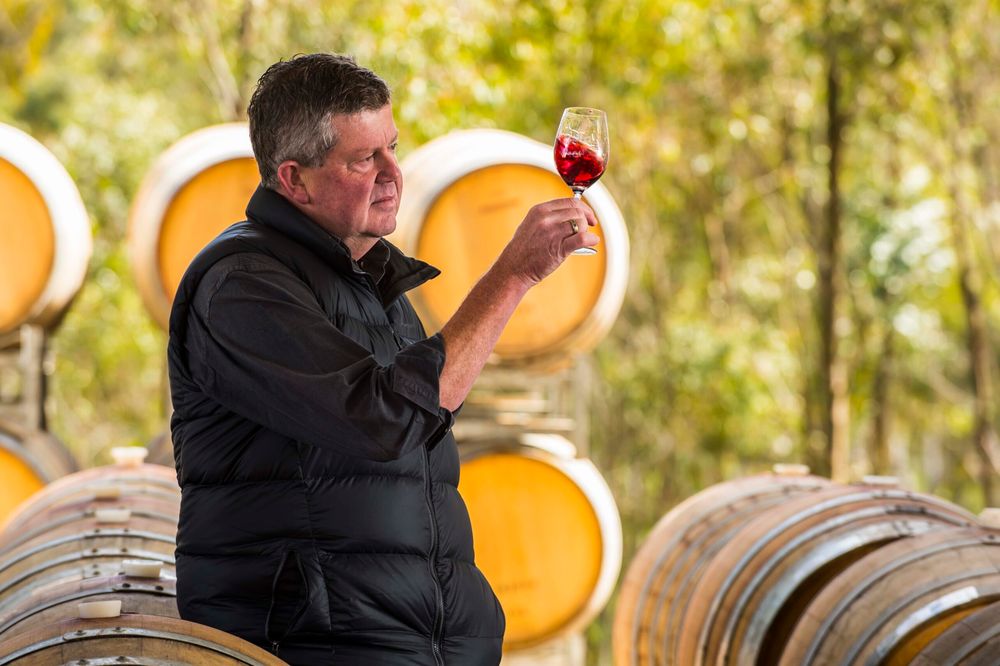
Tim Adams is keen to get back into the UK where he was once so successful with his own wines but also his new Mr. Mick wine brand. Photo: John Krüger
Even before the pandemic Adams had his sights set on opening up more markets for his wines around the world with the UK high up on his hit list. A market he has been successful in since the mid 1990s, and is keen to escalate.
With its borders closed Australia has become one big wine market of its own with Adams enjoying huge success domestically, along with so many of his colleagues and peers in the Australian wine industry.
“Demand has gone through the roof,” he says. “Where we do have excess wines to sell is down to the situation in China.”
Up to now most of that “slack” he has been able to split between Australia and New Zealand where he has long had good distribution and sales.
Pushing exports
But it means his overall export sales are down to around 15% of the business, compared to 30% historically. Which is where Andrew De Zolt comes in as the company’s new director of business development.
“It’s a good move for us to have someone of Andrew’s calibre come on board,” says Adams.
Its initial new export successes in 2021 have come in South Korea, Hong Kong and Malaysia. “This has been very important for us as these are such a lucrative markets. We have also opened the Pacific Islands in preparation for the post pandemic tourist boom,” says De Zolt.
Whilst its borders remain closed Australian producers have no choice but to rely on the likes of Zoom to do their marketing calls. It’s an approach that, whilst not ideal, has not damaged relationships and, in many ways, has helped to level the playing field and open up new conversations, he adds.
“People are now so much more receptive to Zoom and digital than ever before. Even in our home market we are having good meetings with key buyers at major chains like Coles and Woolworths online. It’s been quite a game changer,” says De Zolt.
Unique time

Not being able to travel has been a unique time for Tim Adams to spend at the winery and restaurant with the team and work on new projects. Photo: John Krüger
It has also freed up time for Adams to spend in the winery, much more than he would normally have with the demands on him to be travelling, be it across Australia and overseas.
“It has enabled us to operate more efficiently at home both at the winery and in the vineyards,” he says.
The Tim Adams operation now consist of 200 hectares of its own vines, from which it runs two cellar door businesses and its own premium restaurant. It’s a far cry from when he first started out in 1985 with what he says was a “A$6,000 overdraft, a few plastic tanks and a rented tin shed”.
“That’s how life started for us with my mother doing the books. We opened the cellar door in 1986 and struggled like crazy,” he recalls.
So much so Adams did consultancy winemaking, tractor work, and teaching to pay the bills whilst step by step his own winery business started to gather momentum going into the 1990s. At about this time Tim’s wife Pam gave up her nursing career and became general manager of the business until she retired last year.
He says when he first started out it was very much focused on what the Clare Valley was good at – Shiraz and Riesling. “Shiraz and Riesling have always been key for us and we now have different tiers to offer.”
Then there is Grenache for which Adams will be eternally grateful. It was his neighbour who first sold him some Grenache grapes in 1993 with which he went on to make one of his most iconic wines, The Fergus, a blend of Grenache, Tempranillo and Malbec. A wine that has won virtually every award going over the years, including IWC’s best wine of the year in 2004 and 2005.
“It has turned into a bit of a cult wine,” says Adams, “and has a big following in the UK and Australia.
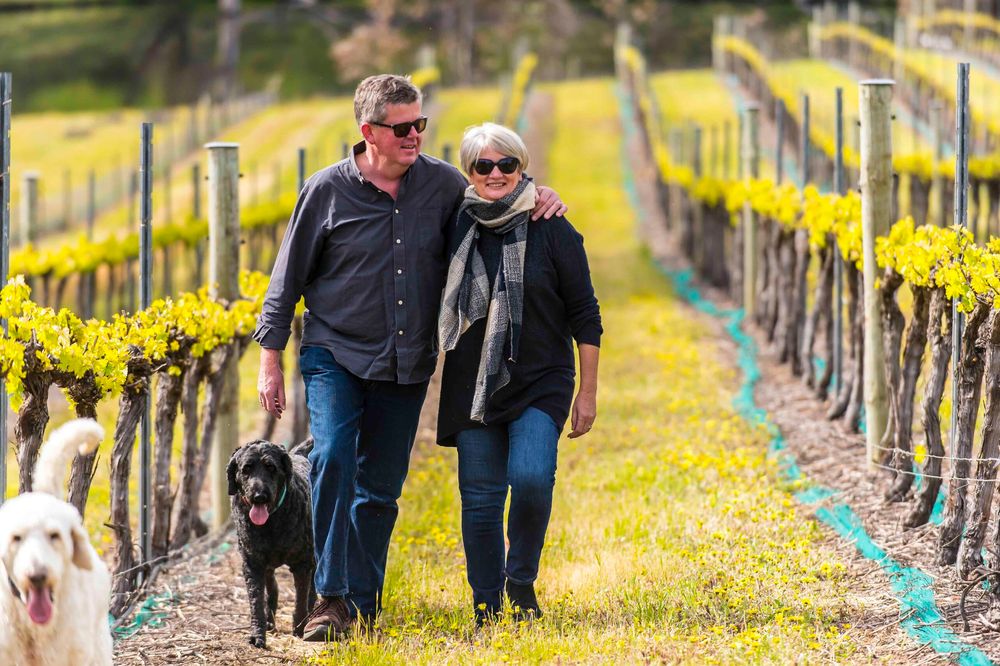
Tim and Pam Adams taking the dogs through a “working” walk. Pam Adams was general manager at the winery until she retired last year. .Photo: John Krüger
European influence
Adams talks about his career with such understatement that you have to prize nuggets of information out of him. But he admits his willingness to travel to Europe and to look at how grape varieties like Grenache grow in the countries where they are from, or have had most success, was crucial in how he could work with them in Australia.
It was only by going to Spain, for example, and looking at what else grew alongside Grenache that he came across Tempranillo and brought that to the Tim Adams portfolio.
“We then went to Alsace to see what else grew alongside Riesling,” he says, which is where our love and dedication for Pinot Gris came from.
“Tempranillo and Pinot Gris have become runaway trains ever since,” he admits, and have also become an enormous factor in making the Tim Adams portfolio of wines as influential as they are.
“We have always been interested in innovating and we still put a lot of focus on that now.”
High hopes for Mr. Mick
When it comes to export and, in particular, the UK market, Adams has high hopes for its Mr. Mick brand which has enjoyed huge success in Australia.
The wine is named after the legendary winemaker, “Mr Mick” Knappstein, where Adams first started his career as an apprentice winemaker back in 1975. It was during his nearly 12 years there that, he says, he worked side by side with Mr Mick and hung on his every word. It was also during this time he studied wine science and became a winemaker himself in 1982.
The two forged a close friendship during those years before “Mr Mick’s” retirement in 1985. When the Knappstein estate (by this time part of the Constellation stable) came on the market in 2010, Adams was quick to bring it into his own family business. They have not only gone on to restore and turn the picturesque property into a successful winery it has become a key tourist attraction in its own right in the Clare Valley.
He now hopes he can help the Knappstein name Iive on through the Mr. Mick brand, which he says is based on Knappstein’s motto to make “affordable wines for everyone to enjoy”.
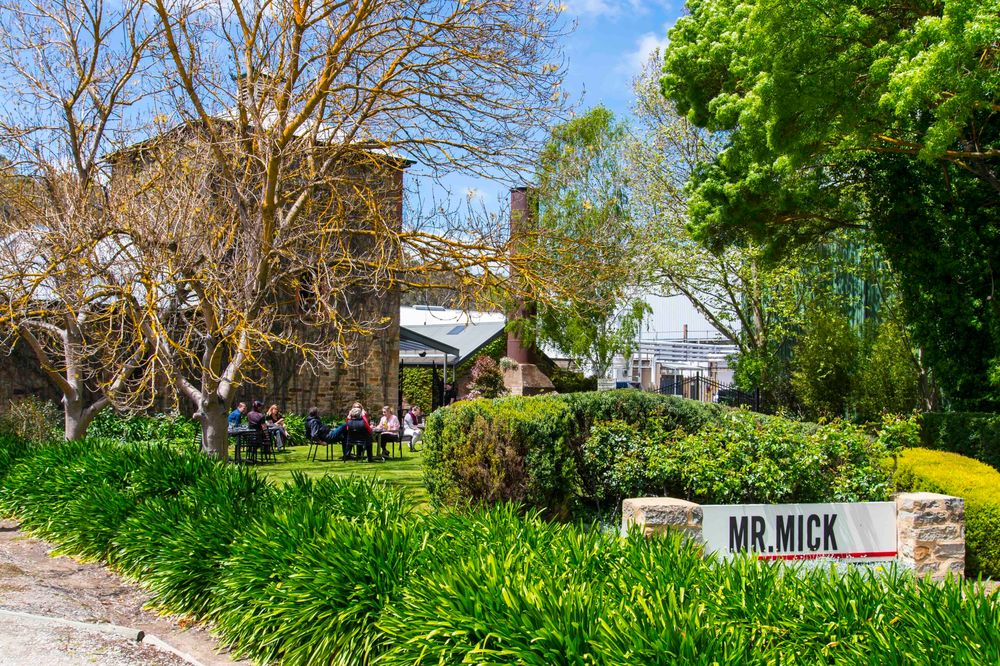
The Mr. Mick wine brand is a homage to the late “Mr Mick” Knappstein with whom Tim Adams first started working. Photo: John Krüger
The Mr. Mick brand is already 10 years old and has developed strong sales across its varietal range – starting initially with the “staples” such as Riesling, Shiraz, Cabernet and Merlot – before developing a Sangiovese rosé, a Tempranillo, Grenache, Pinot Grigio and Vermentino.
“It’s a privilege to work with these varieties and see what we can do with them. It is highlighting new wines from Australia which is really exciting. We also want to give wine drinkers new experiences with varieties as yet undiscovered.”
The Mr. Mick brand retails around A$17 in Australia – which would place it at a good competitive price of below £10 in the UK.
Adams says he is able to keep the cost reasonably low thanks to the efficiency of the winery where he makes the Mr Mick wines that has the capacity to work with 5,000 tonnes of fruit.
His own premium Tim Adams wines, presently distributed in the UK through Bibendum, are made in a separate, smaller capacity winery better suited to making smaller batch wines.
All of which means they are in the enviable position of struggling to “keep up with sales”.
It means the Mr Mick brand and profile is getting back to the size and scale it was 40 years ago. “That was one of my missions. We are now back to employing 60 people and recently added a bottling line and storage facility to the Mr Mick property.”
He adds: “We are also teaching the next generation of winemakers and cellar door teams as well. That’s the same philosophy and approach that Mr Mick had with me when I first started out. He made such a massive contribution to our community and it is nice to be able to follow, a little, in his footsteps.”

Tim Adams believes the UK market is ready for a new Australian wine brand – Mr.Mick
Mr Mick is also a great Australian wine brand ideal for export, claims Adams. One that can proudly wave its flag overseas. Which is why he is keen to get good UK distribution to support the success it is seeing in other parts of the world.
“We want that extra distribution to cement the brand internationally, so we are not just reliant on the Australian market. We think we have some great quality and value wines to offer.
UK focus
Adams has enjoyed a long, successful career working in the UK. In fact it was one of its initial export successes, working with Craig Smith who now runs the Australian Wine Centre and still sells Tim Adams wines direct to consumer.
Adams was also one of a number of leading Australian producers that Phil Reedman MW helped introduce to Tesco and encouraged the use of screwcap in the mid 2000s.
A controversial move at the time but one that he and the Australian wine industry have not looked back on since.
He has, though, built his name and reputation in the UK through his long-standing relationship with Craig Smith and more recently Bibendum, particularly for the classic Tim Adams white label range, that they have developed together over the years.
The Bibendum connection has also seen his daughter, Frances Adams, join the company and is part of its London account manager team.
But he is looking to find a different partner to introduce the Mr. Mick range to the wider UK market as it was felt it was not the right fit to have the Tim Adams range and Mr. Mick with the same supplier.
“We would dearly love Mr. Mick in the UK market,” he admits. “It’s a brand that is not looking to buy market share through driving lower prices. It is a brand that can last a long time and build growth for our partners too. I don’t think we have seen enough commitment around building up brands, with too much focus on price. But we can deliver great quality wine at a consistent price point.”
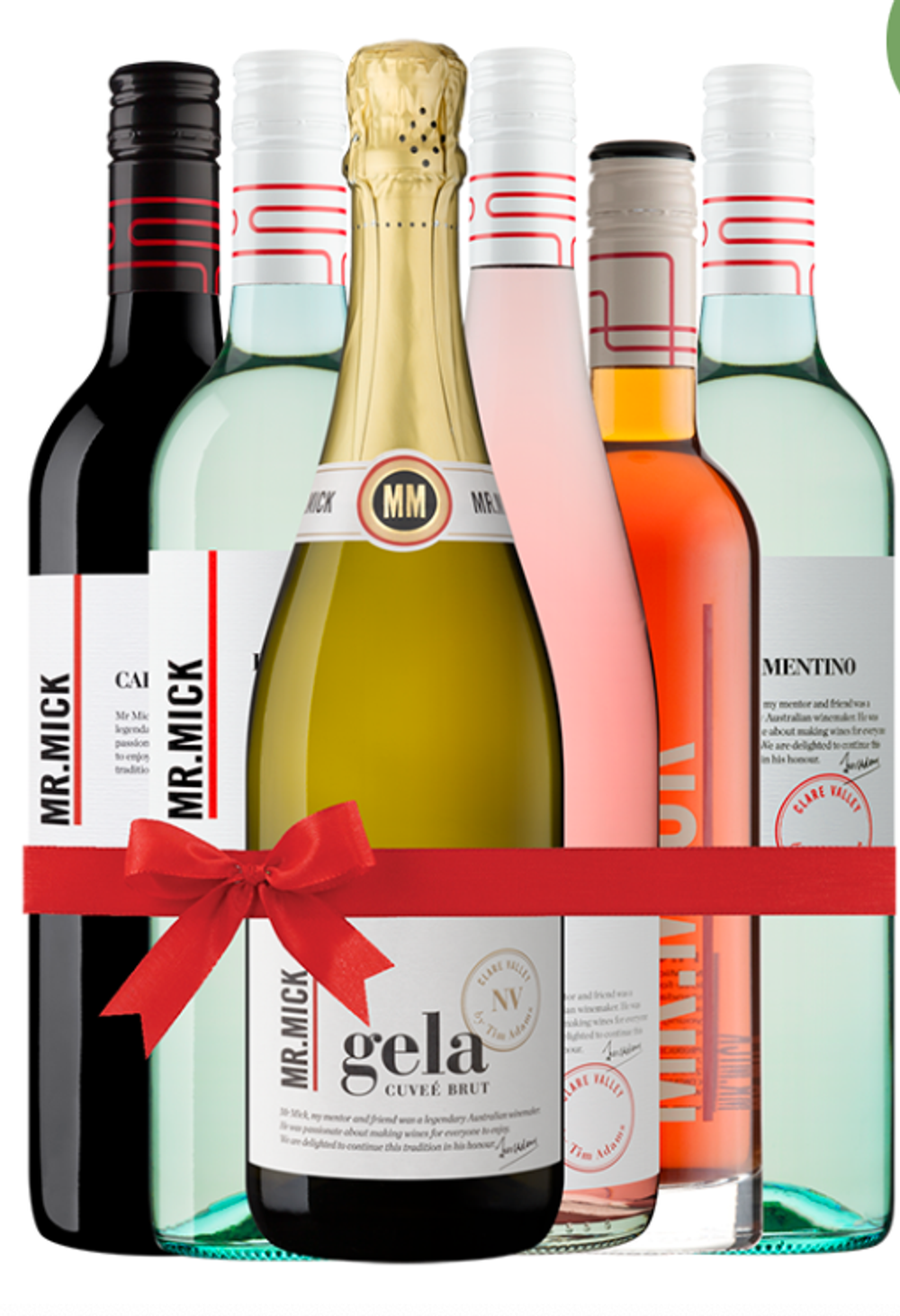
Tim Adams is currently looking for a new partner for the Mr.Mick range in the UK
He adds: “I think we have got the whole story for this brand. It’s a true story about Australian winemaking and celebrates the legacy of Mr. Mick. It has the chance to create a strong following for a brand that has not been dreamt up by an accountant or a brand team. It’s a real story worthy of reputation around the world with some truly innovative viticulture and winemaking.”
It’s a brand he is also confident can drive big volumes in the UK and would consider potential bottling partners to help drive sales too.
As for the future Adams is excited about just how far and wide he can take certain grape varieties and feels Australia’s wine regions are still only just starting to find out what works best where.
“We think Fiano is going to become our next trend white wine. It may not be as big as Pinot Gris, but it is a variety that does really well here and just has wonderful flavours. We love working with it as a winemakers.”
Working with different varieties is also an opportunity for Tim Adams to work with a wider number of growers to make sure they have access to the fruit they need. He also has plans to plant a further 30 hectares of his own, with more Riesling, Pinot Gris, Sangiovese, Grenache and Fiano planned.
Modern wine buying
De Zolt believes that the company’s strategy is very much in keeping with what modern wine buyers are looking for. Where it is less about the what a particular producer in a set wine region can do for you – like the Clare Valley – but what styles and varieties of wine they can offer you.
It is about being able to provide a wine or a SKU to fill a gap on a shelf, he adds. Be it a blended rosé, a Pinot Grigio or a Fiano. As a producer you need to be able to work to those demands rather than go to a distributor with a set, pre-determined range of wines with no flexibility or options to give them.
“You don’t want to be boxed in by being, say, a Clare Valley producer,” he explains. “Now buyers are looking to buy by style. That’s been the big change in the market over the last 15 years.” We think we are perfectly poised with the varietal resources both in Clare and across South Australia to be able to deliver on these opportunities.
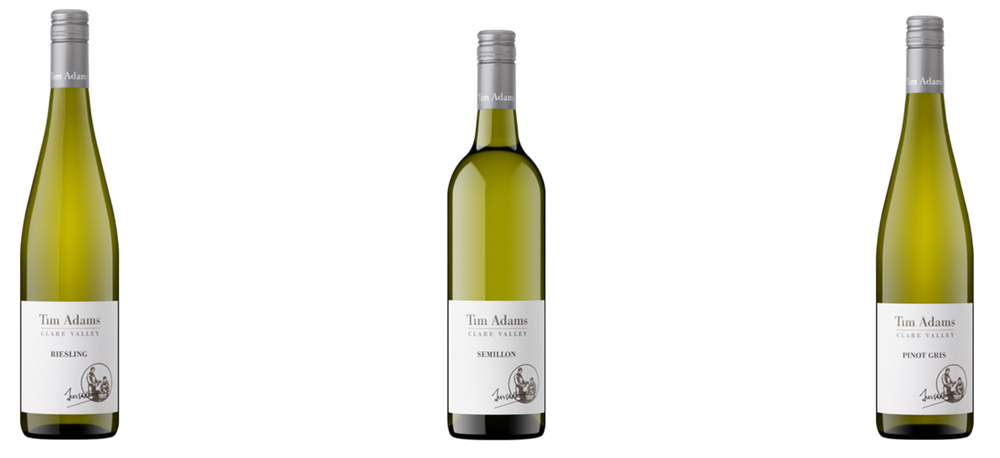
The classic white label range from Tim Adams
De Zolt believes the time is right for producers of the size, calibre and reputation of Tim Adams to really capitalise on the fact China has closed its borders. The Australian wine trade, he argues, was guilty of concentrating and spending far too much of its time trying to push wines into a country where even after years of work you still did not really know what was going on.
Many producers chased the Chinese market so hard that they “put all their eggs in that one basket” and are now struggling to recover, he adds. “They moved away from Europe and the UK and burnt those relationships,” he says, for a market that was like “having 100 balls in the air where two might be successful”. “China was such a wild card. It was haphazard impossible to forecast.
The Tim Adams strategy was just to see China as another route to market, says De Zolt. With such strong domestic sales driving the business it is potentially in a much stronger position to really drive exports around the world.
“It’s a good time to have a diversified business model to move forward,” he adds.
The big hope now is that the success it has had with Mr. Mick in Australia it can start to replicate in the UK. One step at a time.
- The main Tim Adams range of wines is imported by Bibendum. Bibendum is a partner supporter to The Buyer.









































